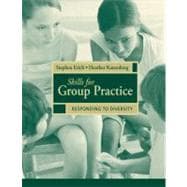
Note: Supplemental materials are not guaranteed with Rental or Used book purchases.
Purchase Benefits
What is included with this book?
PREFACE
Acknowledgments
CONTRIBUTOR NOTES
SECTION 1: USING THE TEXT
Chapter 1: Introduction & What To Expect
The Chapters: Deconstructed
The Joker(s)
Reflection/Process Prompts
Theory Review
Person in Environment Perspectives
System Theories
The Ecological Model
Ecological Perspective
Field Theory
Structural Functionalism
Feminist Theories
Queer Theory
Strengths Perspective
Empowerment Perspective
Cognitive/Behavioral Theories
Psychodynamic Theory
Skills
Chart: Group and Individual Skills
Stages of Group Development
Brief Checklist of Items to Remember When Facilitating a Group
SECTION 2: OPEN MEMBERSHIP TREATMENT GROUPS
Chapter 2: Lesbian, Gay, Bisexual, Transgender, Instersex, Queer/Questioning (LGBTIQ) Adolescents “Coming Out” group.
Before You Begin
Scenario
Group Facilitator Tasks
Roles for Group Members
Observer Tasks
Reflecting on the Group Session
Summary, Key Concepts and Principles
Web Resources
Chapter 3:School-based Social Worker and At Risk Adolescents
Before You Begin
Scenario
Group Facilitator Tasks
Roles for Group Members
Observer Tasks
Reflecting on the Group Session
Summary, Key Concepts and Principles
Web Resources
Chapter 4: Social, Economic, and Cultural Context of African Americans living with HIV/AIDS in the Open Community
Before You Begin
Scenario
Group Facilitator Tasks
Roles for Group Members
Observer Tasks
Reflecting on the Group Session
Summary, Key Concepts and Principles
Web Resources
Chapter 5: Veterans with Post Traumatic Stress Disorder (PTSD)
Before You Begin
Scenario
Group Facilitator Tasks
Roles for Group Members
Observer Tasks
Reflecting on the Group Session
Summary, Key Concepts and Principles
Web Resources
Chapter 6: Younger and Older Adolescents in Residential Treatment
Before You Begin
Scenario
Group Facilitator Tasks
Roles for Group Members
Observer Tasks
Reflecting on the Group Session
Summary, Key Concepts and Principles
Web Resources
SECTION 3: CLOSED AND TIME LIMITED TREATMENT GROUPS
Chapter 7: Single Mothers who Have Experienced Episodic Homelessness
Before You Begin
Scenario
Group Facilitator Tasks
Roles for Group Members
Observer Tasks
Reflecting on the Group Session
Summary, Key Concepts and Principles
Web Resources
Chapter 8: Bi-Racial Couples
Before You Begin
Scenario
Group Facilitator Tasks
Roles for Group Members
Observer Tasks
Reflecting on the Group Session
Summary, Key Concepts and Principles
Web Resources
Chapter 9: Post-Adoption Family Group
Before You Begin
Scenario
Group Facilitator Tasks
Roles for Group Members
Observer Tasks
Reflecting on the Group Session
Summary, Key Concepts and Principles
Web Resources
Chapter 10: Adults With Substance Abuse Disorders
Before You Begin
Scenario
Group Facilitator Tasks
Roles for Group Members
Observer Tasks
Reflecting on the Group Session
Summary, Key Concepts and Principles
Web Resources
Chapter 11: Demonstrating the Use of Group Supervision
Before You Begin
Scenario
Group Facilitator Tasks
Roles for Group Members
Observer Tasks
Reflecting on the Group Session
Summary, Key Concepts and Principles
Web Resources
Chapter 12: Hospice Planning for Loss: Children With a Parent Who Has a Terminal Illness
Before You Begin
Scenario
Group Facilitator Tasks
Roles for Group Members
Observer Tasks
Reflecting on the Group Session
Summary, Key Concepts and Principle
Web Resources
Chapter 13: Couples Who have One Partner With a Terminal Form of Cancer
Before You Begin
Scenario
Group Facilitator Tasks
Roles for Group Members
Observer Tasks
Reflecting on the Group Session
Summary, Key Concepts and Principle
Web Resources
Chapter 14: Adult Parolees
Before You Begin
Scenario
Group Facilitator Tasks
Roles for Group Members
Observer Tasks
Reflecting on the Group Session
Summary, Key Concepts and Principle
Web Resources
SECTION 4: TASK GROUPS
Chapter 15: A Social Action Committee Addressing Neighborhood Gang Violence
Before You Begin
Scenario
Group Facilitator Tasks
Roles for Group Members
Observer Tasks
Reflecting on the Group Session
Summary, Key Concepts and Principle
Web Resources
Chapter 16: A Social Work Political Action Committee
Before You Begin
Scenario
Group Facilitator Tasks
Roles for Group Members
Observer Tasks
Reflecting on the Group Session
Summary, Key Concepts and Principle
Web Resources
Chapter 17: A Community Health Coalition
Before You Begin
Scenario
Group Facilitator Tasks
Roles for Group Members
Observer Tasks
Reflecting on the Group Session
Summary, Key Concepts and Principle
Web Resources
Chapter 18: An Intra-Agency Grant Writing Team
Before You Begin
Scenario
Group Facilitator Tasks
Roles for Group Members
Observer Tasks
Reflecting on the Group Session
Summary, Key Concepts and Principle
Web Resources
Chapter 19: A Community Council in a Refugee Camp in an Unnamed Country in Southern Africa
Before You Begin
Scenario
Group Facilitator Tasks
Roles for Group Members
Observer Tasks
Reflecting on the Group Session
Summary, Key Concepts and Principle
Web Resources
Chapter 20: Promotion and Support of the Practice of Self Care and Social Work
Before You BeginScenario
Group Facilitator Tasks
Roles for Group Members
Observer Tasks
Reflecting on the Group Session
Summary, Key Concepts and Principle
Web Resources
APPENDICES
Appendix 1: Sample Treatment Group Agenda
Appendix 2: Sample Task Group Agenda
Appendix 3: Central State Voting Guide (For use in Chapter 16)
REFERENCES
The New copy of this book will include any supplemental materials advertised. Please check the title of the book to determine if it should include any access cards, study guides, lab manuals, CDs, etc.
The Used, Rental and eBook copies of this book are not guaranteed to include any supplemental materials. Typically, only the book itself is included. This is true even if the title states it includes any access cards, study guides, lab manuals, CDs, etc.